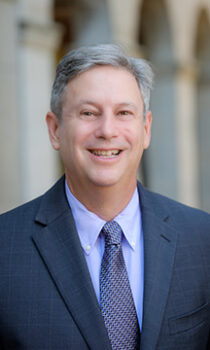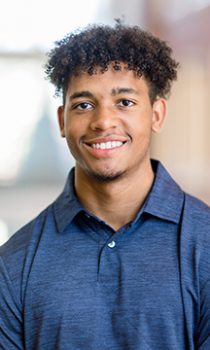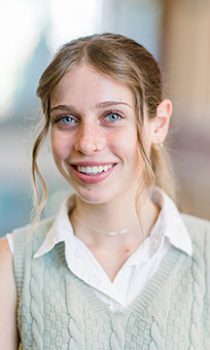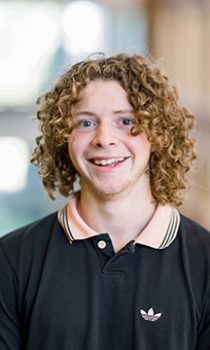
by Kim McGrath | mc******@*fu.edu | 336.758.3209
“How many people like milkshakes,” Dan Cohen, executive director of the Wake Forest Center for Entrepreneurship asks 50 high school students in the University’s Summer Immersion Program.

Dan Cohen
Nearly all hands are raised in the classroom where Cohen is discussing “white space,” which in business is a gap in customer needs or desires. In this example, a customer can go to a fast-food restaurant and order a $2 milkshake but only in basic flavors like vanilla, chocolate or strawberry. Another alternative is to visit a high-end ice cream shop and pay $8 for a wide variety of flavors and add-ins. Is it possible to offer a $4 option between the two choices where milkshakes with several flavor options are available for a mid-range price? This is a sweet spot for an entrepreneur.
The milkshake problem is a true story that ends with the invention of a self-serve, self-cleaning frozen drink machine that actually did fill that white space – but only after nearly a decade of ups and downs and personal and family sacrifice.
A student asks, “How did he know that no one else would come up with the idea in the nine years it took him to develop the machine?” He didn’t, Cohen answers.
Students arrived on campus on a Sunday for the Entrepreneurship Institute and spent four days learning how to identify problems, develop ideas, build resiliency and define target markets. They heard from entrepreneurs about the long hours, hard work and stumbling blocks to success involved in making dreams a reality.

Caleb Walker
Caleb Walker, a rising junior from Atlanta, said that being an entrepreneur is not something he considered for himself. “My dad was an entrepreneur, and I saw how hard he worked. But this camp has inspired me. I don’t want to work for someone else.”
Planning and pitching
From a recycling machine that converts paper products into other paper products to nail polish that measures UV rays to a bike helmet that looks like a baseball cap, students developed ideas for a spin on “Shark Tank” called “Deac Tank.”
Using a method that Cohen calls “entrepreneurial speed dating,” the students organized into 12 teams by forming two lines. One line stands still. Students in the second line rotate. They have 60 seconds to pitch each other. “Each student gets to hear the others’ ideas, so they team up with people whose ideas resonate with their own,” he said.
Students used the IDEATE method, developed by Cohen and co-faculty member Greg Pool, to come up with their concepts for the competition. IDEATE involves identifying a “headache problem” and generating 100 ideas for ways to solve it. The biggest challenge for students was deciding which of their ideas the team wanted to put forward.
On pitch day, the groups each had four minutes to present their product or service and two minutes to field questions from judges Clay Johnson, director of Entrepreneurial Initiatives at Greater Winston-Salem Inc., and Bren Varner, Program Director of Wake Forest’s Business and Enterprise Management major.
At the end of the Deac Tank presentations, Helmet Hat, the product designed as a stylish alternative to the less-than-fashionable oval bike helmet, was named winner of the competition.
Role modeling
Winston Starts, a local organization dedicated to nurturing entrepreneurs as they scale their businesses, partnered with Wake Forest to provide opportunities for the high schoolers to tour the startup space and meet entrepreneurs.
Students heard stories from business and enterprise management major and 2020 Wake Forest grad Sam Chason who launched Storage Scholars. His business idea not only landed him a coveted Deac Fast Pass to Winston Starts it also allowed him to graduate debt-free.

Charli Zielinski
Leah Wyrick also met with the students. She is a 2022 graduate who launched Three Strands Recover Wear – designing feminine, comfortable bras for recovering breast cancer patients.
For rising high school junior Charli Zielinski from Maui, Hawaii, meeting entrepreneurs was one of the highlights of the week, including Alex Smereczniak, the founder of 2U Laundry. A decade ago, Smereczniak started Wake Wash, a student-run business that offered laundry and dry-cleaning services to students as part of a classroom assignment to start and run a business for three days and $40.
“For our summer immersion students who are interested in entrepreneurship, it’s valuable to talk with the people who are practicing it right now. The students listen to stories of the highs and the lows of starting a business,” Cohen said.
Learned optimism
Hearing stories of struggles and challenges counters the idea that entrepreneurial success is for the lucky.
Zach Faber, a rising senior from Miami, said he used to think of entrepreneurship as a longshot. “Hearing from entrepreneurs made me realize that starting a business is something you can do safely. It’s inspirational to know that entrepreneurs are not outliers.”

Zach Faber
Stories making headlines focus on the geniuses who single-handedly take an idea and turn it into a billion-dollar business. “Young entrepreneurs read a lot in the media that doesn’t reveal the struggles of starting your own business,” Cohen said. “They read about overnight successes where you have an idea and then you just get rich. When students hear about the real challenges and struggles entrepreneurs face, it makes starting a business seem more realistic and achievable.”
For Faber, the importance of planning, preparation and confidence was a big takeaway. “One of the best things I learned was to be optimistic,” he said. “By thinking the right way, you can change any situation into a positive.”
About Wake Forest University’s Summer Immersion Program
The Wake Forest Summer Immersion Program is a hands-on learning experience. One hundred high school students participated in the Summer Immersion Program’s Entrepreneurship Institute. Students come from all over the world to attend one of the 18 institutes offered. Of the 1,300 in the 2022 program, all 50 states are represented and more than 28 countries.
“How many people like milkshakes,” Dan Cohen, executive director of the Wake Forest Center for Entrepreneurship asks 50 high school students in the University’s Summer Immersion Program.
Dan Cohen
Nearly all hands are raised in the classroom where Cohen is discussing “white space,” which in business is a gap in customer needs or desires. In this example, a customer can go to a fast-food restaurant and order a $2 milkshake but only in basic flavors like vanilla, chocolate or strawberry. Another alternative is to visit a high-end ice cream shop and pay $8 for a wide variety of flavors and add-ins. Is it possible to offer a $4 option between the two choices where milkshakes with several flavor options are available for a mid-range price? This is a sweet spot for an entrepreneur.
The milkshake problem is a true story that ends with the invention of a self-serve, self-cleaning frozen drink machine that actually did fill that white space – but only after nearly a decade of ups and downs and personal and family sacrifice.
A student asks, “How did he know that no one else would come up with the idea in the nine years it took him to develop the machine?” He didn’t, Cohen answers.
Students arrived on campus on a Sunday for the Entrepreneurship Institute and spent four days learning how to identify problems, develop ideas, build resiliency and define target markets. They heard from entrepreneurs about the long hours, hard work and stumbling blocks to success involved in making dreams a reality.
Caleb Walker
Caleb Walker, a rising junior from Atlanta, said that being an entrepreneur is not something he considered for himself. “My dad was an entrepreneur, and I saw how hard he worked. But this camp has inspired me. I don’t want to work for someone else.”
From a recycling machine that converts paper products into other paper products to nail polish that measures UV rays to a bike helmet that looks like a baseball cap, students developed ideas for a spin on “Shark Tank” called “Deac Tank.”
Using a method that Cohen calls “entrepreneurial speed dating,” the students organized into 12 teams by forming two lines. One line stands still. Students in the second line rotate. They have 60 seconds to pitch each other. “Each student gets to hear the others’ ideas, so they team up with people whose ideas resonate with their own,” he said.
Students used the IDEATE method, developed by Cohen and co-faculty member Greg Pool, to come up with their concepts for the competition. IDEATE involves identifying a “headache problem” and generating 100 ideas for ways to solve it. The biggest challenge for students was deciding which of their ideas the team wanted to put forward.
On pitch day, the groups each had four minutes to present their product or service and two minutes to field questions from judges Clay Johnson, director of Entrepreneurial Initiatives at Greater Winston-Salem Inc., and Bren Varner, Program Director of Wake Forest’s Business and Enterprise Management major.
At the end of the Deac Tank presentations, Helmet Hat, the product designed as a stylish alternative to the less-than-fashionable oval bike helmet, was named winner of the competition.
Winston Starts, a local organization dedicated to nurturing entrepreneurs as they scale their businesses, partnered with Wake Forest to provide opportunities for the high schoolers to tour the startup space and meet entrepreneurs.
Students heard stories from business and enterprise management major and 2020 Wake Forest grad Sam Chason who launched Storage Scholars. His business idea not only landed him a coveted Deac Fast Pass to Winston Starts it also allowed him to graduate debt-free.
Charli Zielinski
Leah Wyrick also met with the students. She is a 2022 graduate who launched Three Strands Recover Wear – designing feminine, comfortable bras for recovering breast cancer patients.
For rising high school junior Charli Zielinski from Maui, Hawaii, meeting entrepreneurs was one of the highlights of the week, including Alex Smereczniak, the founder of 2U Laundry. A decade ago, Smereczniak started Wake Wash, a student-run business that offered laundry and dry-cleaning services to students as part of a classroom assignment to start and run a business for three days and $40.
“For our summer immersion students who are interested in entrepreneurship, it’s valuable to talk with the people who are practicing it right now. The students listen to stories of the highs and the lows of starting a business,” Cohen said.
Hearing stories of struggles and challenges counters the idea that entrepreneurial success is for the lucky.
Zach Faber, a rising senior from Miami, said he used to think of entrepreneurship as a longshot. “Hearing from entrepreneurs made me realize that starting a business is something you can do safely. It’s inspirational to know that entrepreneurs are not outliers.”
Zach Faber
Stories making headlines focus on the geniuses who single-handedly take an idea and turn it into a billion-dollar business. “Young entrepreneurs read a lot in the media that doesn’t reveal the struggles of starting your own business,” Cohen said. “They read about overnight successes where you have an idea and then you just get rich. When students hear about the real challenges and struggles entrepreneurs face, it makes starting a business seem more realistic and achievable.”
For Faber, the importance of planning, preparation and confidence was a big takeaway. “One of the best things I learned was to be optimistic,” he said. “By thinking the right way, you can change any situation into a positive.”
About Wake Forest University’s Summer Immersion Program
The Wake Forest Summer Immersion Program is a hands-on learning experience. One hundred high school students participated in the Summer Immersion Program’s Entrepreneurship Institute. Students come from all over the world to attend one of the 18 institutes offered. Of the 1,300 in the 2022 program, all 50 states are represented and more than 28 countries.
Categories: Top Stories
Media Contact
Kim McGrath
mc******@*fu.edu | 336.758.3209 | @KimMcGrath
A cloudy forecast for political futures markets
Paying for exercise coaching now keeps older adults out of hospital
WFU in the news: Aug. 1-7
Sign up for weekly news highlights.
We are Wake Forest University’s primary news source and first point of contact for reporters. We help media by facilitating interviews, connecting with faculty experts or providing interesting story ideas. A staff member is on call 24/7 for media requests at 336.758.5237. Our team also offers a variety of communications resources for Wake Forest students, faculty and staff.
336.758.5237
me***@*fu.edu
Meet the News Team
1834 Wake Forest Road
Winston-Salem, NC 27106
A Private Liberal Arts University in Winston-Salem, North Carolina
 / Founded 1834 / Pro Humanitate
/ Founded 1834 / Pro HumanitateA gift to the Wake Forest Fund supports student needs immediately.
Where the most loyal Wake Forest supporters belong.
1834 Wake Forest Road, Winston-Salem, NC 27109
® 2022 Wake Forest University
source










